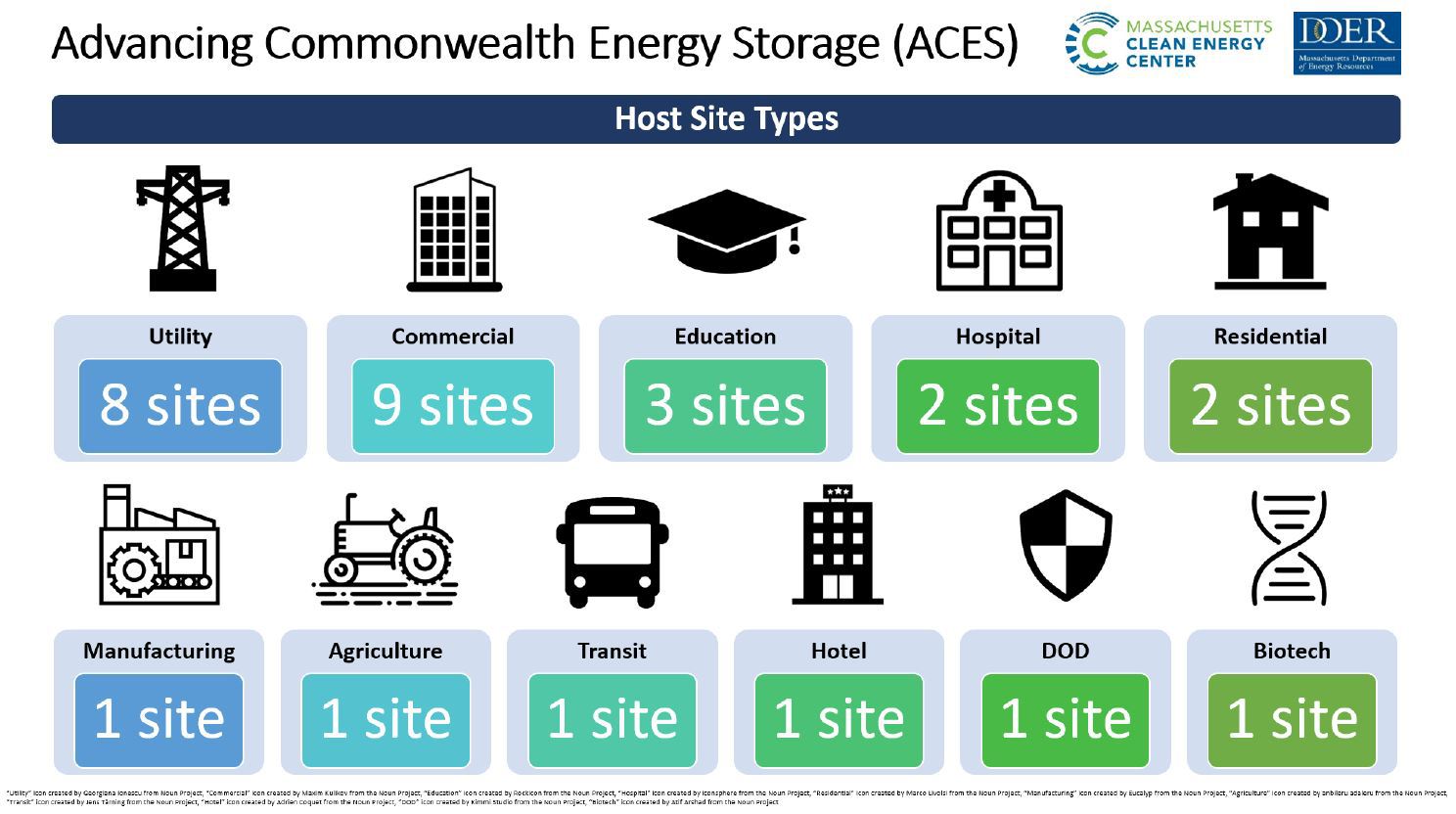July 30, 2018
Advancing Energy Storage Technologies to Meet Clean Energy Goals in Massachusetts
By Todd Olinsky-Paul
 Energy storage is a clean energy technology with many potential benefits to the electric grid and all segments of the energy market. Massachusetts’ Advancing Commonwealth Energy Storage (ACES) grant program, part of the Baker-Polito Administration’s Energy Storage Initiative (ESI), was created to jump-start the energy storage industry by piloting innovative, broadly-replicable demonstration projects with multiple value streams, thereby priming Massachusetts for increased commercialization and deployment.
Energy storage is a clean energy technology with many potential benefits to the electric grid and all segments of the energy market. Massachusetts’ Advancing Commonwealth Energy Storage (ACES) grant program, part of the Baker-Polito Administration’s Energy Storage Initiative (ESI), was created to jump-start the energy storage industry by piloting innovative, broadly-replicable demonstration projects with multiple value streams, thereby priming Massachusetts for increased commercialization and deployment.
In December 2017, the Massachusetts Department of Energy Resources (DOER) and the Massachusetts Clean Energy Center (MassCEC) awarded ACES grants totaling $20 million to 26 demonstration projects spanning nine use cases and 14 business models, which will collectively add 83 MWh to the grid where only 7 MWh currently exists. This is expected to accelerate the adoption of storage technologies, provide benefits to customers and utilities, highlight market and regulatory barriers, and help Massachusetts reach its goal of 200 MWh of energy storage installed by January 1, 2020.
The ACES Program is Massachusetts’ first substantial investment in energy storage projects and is designed to significantly catalyze the market. While technology demonstration programs are common, this program is unique in its business model demonstration objectives.
A Strategic Statewide Commitment to Advancing Energy Storage
In the first phase of the Massachusetts Energy Storage Initiative (ESI), DOER and MassCEC produced an energy storage study, State of Charge, which presented a broad view of energy storage technologies in order to inform future policy and programs. The study, published in 2016, provided insights into Massachusetts-specific opportunities to advance energy storage, an analysis of grid conditions in Massachusetts, and lessons from other states.
The ACES Program is part of ESI’s second phase. MassCEC and DOER worked in partnership to create the ACES Program, which was designed to educate customers, utilities, consumers, policy makers and a variety of industry stakeholders on the benefits of energy storage; encourage appropriate regulatory and market reform to broaden the monetizable use cases available to energy storage; and help de-risk future investments in energy storage projects.
One of the innovative features of the ACES Program is the focus on demonstrating how storage systems can achieve benefits that are currently non-monetizable, thereby addressing a significant barrier to the development of the storage market that was identified by the State of Charge report. These currently non-monetizable benefits include cost reductions in the wholesale market; provision of ancillary services; lowered energy prices; services to the transmission and distribution grids; increased renewables integration; reduced peak demand; resiliency benefits; and greenhouse gas emissions reductions.
A Wide Array of Projects Demonstrate the Range of Benefits from Energy Storage
The ACES projects demonstrate nine diverse energy storage use cases and a variety of benefits. The program’s focus on replicable business models is expected to accelerate storage commercialization by showcasing adoptable and achievable examples of projects that provide multiple benefits and positive economic returns. Most projects provide both system benefits and customer benefits, and some address specific local energy challenges. ACES grantees provide a foundation for the industry to demonstrate storage services and benefits for which no markets currently exist or where there are no existing methods for storage providers to be proportionally compensated for the services their systems provide.
ACES projects span a variety of use cases, including transit, behind-the-meter commercial and industrial solar+storage, municipal light plant assets, medical facility applications, and a merchant co-located with traditional generation plant, among others. Examples of replicable business models include owner owned and operated energy storage systems, storage-as-a-service, developer or third-party financed systems, and energy storage system leases.
While there is significant representation of lithium-ion (the commercially dominant battery technology) among the awarded projects, the range of technologies among the ACES projects is more diverse than in the current U.S. energy storage market, representing zinc-iron flow, vanadium-redox flow, ice thermal, and flywheels. Most of the ACES projects involve integration with other clean energy technologies such as solar photovoltaics, demonstrating the many benefits of pairing energy storage with renewable energy.
And while it represents a significant investment of public funds, the ACES Program also leverages significant private investment. Awarded projects are required to provide at least a 50 percent cost-share, enabling the program to extend the impact of its grant funds even further. For the 26 projects under ACES, total investment amounts to approximately $20 million in DOER grant funds and $31 million in leveraged cost-share.
Jump-Starting an Industry
Broad replicability was a critical requirement of selected projects in order to prime Massachusetts for increased commercialization and deployment of storage technologies. To further promote the replicability and analysis of storage technologies, MassCEC intends to publicly share anonymized and aggregated lessons learned from the projects at periodic intervals, to inform future project design and implementation. This valuable project feedback is expected to span the market, regulatory, and policy landscapes and will be of benefit to industry, policymakers, and customers. MassCEC also plans to hold periodic stakeholder meetings to share these lessons and foster discussions in an interactive setting.
The data collection, project reports, and insights from ACES projects will provide Massachusetts the opportunity to implement policy and market mechanisms to address barriers to large scale energy storage deployment. The ACES Program is expected to demonstrate that storage is ready to enter new markets at a time when efforts are underway to incorporate storage into existing programs such as the Alternative Portfolio Standard, energy efficiency plans, and the Solar Massachusetts Renewable Target (SMART) incentive program. Additionally, Order No. 841, issued by the Federal Energy Regulatory Commission (FERC), now requires Independent System Operators and Regional Transmission Organizations to revise market rules to allow energy storage to participate and to take the operational attributes of storage into account. This FERC rule is opening new energy markets to participation by energy storage.
The ACES Program is expected to have long-lasting impacts on the energy storage industry. Its successful demonstration of monetizable and non-monetizable benefits will help support new energy storage applications and markets in the Commonwealth and beyond.
The Massachusetts Clean Energy Center and the Massachusetts Department of Energy Resources were awarded a 2018 State Leadership in Clean Energy Award for the ACES Program. A report featuring a detailed case study on this award-winning program is available at: https://www.cesa.org/projects/state-leadership-in-clean-energy/2018.
The Clean Energy States Alliance will host a webinar highlighting the ACES Program on Thursday, August 9th. Speakers from MassCEC will present. Read more about this free webinar and register at: https://www.cesa.org/webinars/building-markets-energy-storage-in-massachusetts-and-offshore-wind-in-rhode-island/
This blog post was also published in Renewable Energy World.














